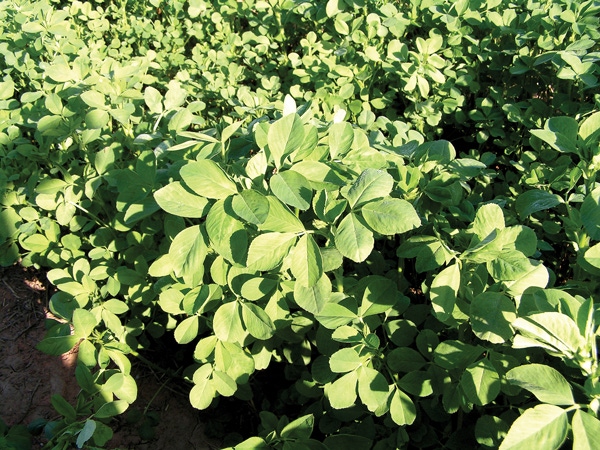
Roundup Ready alfalfa seed sales are likely to resume this coming spring after a four-year hiatus foisted by licentious lawsuits regurgitated from a radical environmental group famous for such legal anti-agriculture shenanigans.A final USDA-APHIS Environmental Impact Statement (EIS) on non-regulated sale of RR alfalfa is expected before the end of this year.McCaslin said there is plenty of seed available for planting this spring, adding that some alfalfa growers have not planted any new fields since the ban, waiting for the RR alfalfa to return.End of 4-year legal roadblock of major biotech crop.
November 22, 2010

Roundup Ready alfalfa seed sales are likely to resume this coming spring after a four-year hiatus foisted by licentious lawsuits regurgitated from a radical environmental group famous for such legal anti-agriculture shenanigans.
Mark McCaslin, president of Forage Genetics, West Salem, Wis., expects a final USDA-APHIS Environmental Impact Statement (EIS) on non-regulated sale of RR alfalfa before the end of this year.
A subsequent 30-day comment period followed by Federal Register posting should open the door for RR alfalfa seed sales for spring planting, according to McCaslin.
When the extremist Center for Food Safety convinced a federal judge in February 2007 that USDA-APHIS needed to develop an EIS to continue the sale of RR alfalfa, seed sales of one of the most promising biotech breakthroughs were halted. This was ordered even though APHIS had prepared an environmental assessment. This assessment included public comment and found no significant impact from RR alfalfa production.
According to McCaslin, the ban on sales cost America’s alfalfa growers $200 million in lost income due to their inability to plant RR alfafa.
However, Judge Charles Brayer of the U.S. District Court for the Northern District of California, did not order growers to rip out 250,000 acres of RR alfalfa that had already been planted after APHIS initially deregulated the sale of herbicide tolerant alfalfa in June 2005.
This proved economically telling during the EIS process. According to McCaslin, the 5,500 producers who planted the glyphosate-tolerant forage crop reported that yields of the transgenic varieties averaged almost 1 ton more hay per acre per year than conventional alfalfas. This translates to $110 per acre per year in added income for those fortunate producers. Also, growers said RR alfalfa stands remained productive longer than conventional alfalfa, thus significantly reducing replanting cost. Quality also was better, according to the growers. It was so good, one Tulare County, Calif., hay grower/dairymen fed summer hay to his milking strings. Typically summer hay is directed to feeding replacement heifers or dry cows or sold into the horse market because the quality is not good enough for lactating cows.
All of these positives “resonated” with surveyed growers, McCaslin said.
Conversely, that survey reflects the potential income loss by producers who were unable to plant RR alfalfa due to the lawsuit, which was subsequently and soundly overturned.
The U.S. Supreme Court, by a vote of 7 to 1 last June, overturned Breyer’s injunction and told APHIS to take interim measures to immediately deregulate RR alfalfa and allow it to be planted. That did not come about.
In the meantime, USDA-APHIS continued work on the draft EIS. When released last January, it elicited thousands of comments, including 1,000 from producers asking that RR alfalfa seed sales resume.
The EIS has taken twice as long as anticipated with the many comments. This four-year process could become very costly if sales are not restarted this spring.
Breyer’s decision banning seed sales in 2007 did not preclude continued production of planting seed. McCaslin told APHIS in a letter late last summer the delay in finalizing the EIS is putting germination quality from three years of seed production in jeopardy.
McCaslin said there is plenty of seed available for planting this spring, adding that some alfalfa growers have not planted any new fields since the ban, waiting for the RR alfalfa to return.
Although there has been no evidence of actual harm to the environment from multiple years of Roundup Ready alfalfa seed and forage production, McCaslin said seed growers are subject to more stringent isolation regulations that conventional seed producers at the company’s insistence.
McCaslin said he is “cautiously optimistic” RR alfalfa seed will go into the ground in the spring of 2011.
Spring may not be an ideal time to plant RR alfalfa, especially in the West, because of the potential for weed competition. Fall is generally the preferred planting window. However, McCaslin said RR alfalfa fits better for spring planting than non herbicide-tolerant alfalfa.
“You can take care of those spring weeds with Roundup Ready alfalfa better than with conventional alfalfa and herbicides available,” he added.
About the Author(s)
You May Also Like





